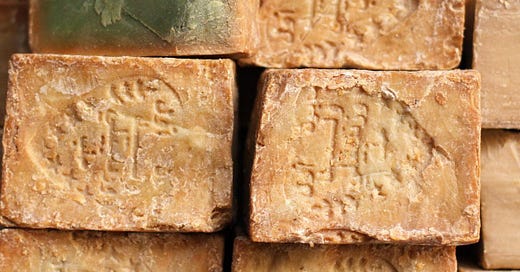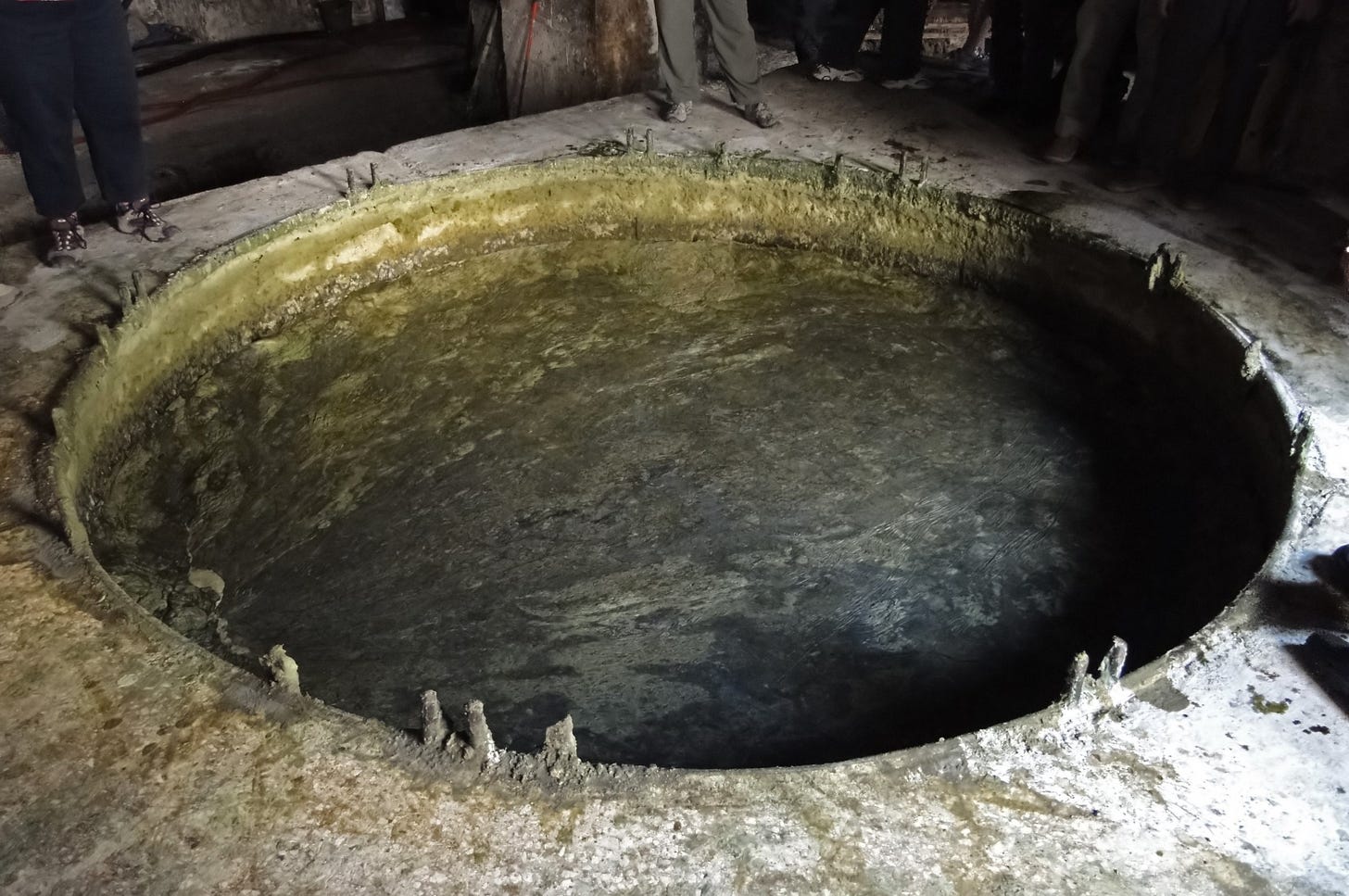Soap Has Always Been With Us, and Longer Still
Soap isn’t a new thing, or even a thing humans invented.
This essay also published at Another World, the Gods&Radicals Press Supporters Journal (paywalled).
We moderns have a rather bizarre tendency to think of the past as a place of tragedy, misery, darkness, and ignorance. Our ancestors were all stupid, living in filth, squalor, and poverty, toiling away at the earth to barely eke out a living from the soil.
I say “bizarre” specifically because this framing is a kind of abnormality in cultural cosmologies. We are one of the very few civilizations that we know of which looks at the past this way, as well as the only one to have such a specific belief in time as linear progression.
No doubt this sounds strange, as it often does to me. It’s very difficult to imagine another way of understanding time, and some of this difficulty derives from our language itself, or rather the linguistic limits built into our language.
To understand these sort of limits, first consider what it might be like to speak in a language that has no past tense, that has no way of differentiating from something that happened yesterday and something that happened a century ago. Imagine how you might tell a story about your child this way, how limited you might feel with the available choice of words and how everything would seem to bleed into the present.
Over a third of the 222 most-spoken languages in the world have no past tense. 1They still have ways of speaking about events which happened, but they don’t have inherent linguistic ways of describing the past as something which no longer exists. Instead, the past functions more like a place that you’re not currently in, or a direction in which you are looking rather than a moment or a time period that has passed.
While this might feel limiting, it’s only because our own linguistic framework is also limited. When you are accustomed to thinking of time as something that travels by you, or a road that you are on which only goes one direction, it’s very difficult to then conceive of a different way of perceiving time. Trapped in our linguistic prisons, we can only perceive time as discrete moments which happen once and then end, rather than an entire forest stretching out in all directions from where we stand.
But don’t despair. There’s a very simple way to escape this prison, a thing that has always been with us, and longer still.
Soap.
Think of the past for a little while, and imagine it the way our modern delusions tell us to imagine it. Imagine what life was like a thousand years ago, or two thousand. Imagine what daily life was like without the ability to wash yourself or your clothes. Imagine how bad people must have smelled, how dirty everything was, how wretched everything looked and how grimy your skin must have felt without the ability to wash with that daily artifact of modern life, soap.
And now realize that all these imaginings are completely wrong.
Soap has always been with us, has always been around as long as we have been around, and even longer.
Soap isn’t a new thing, or even a thing humans invented.
Soap is the offspring of fire, flesh, and water, born in the ashes of forest fires, cooking fires, and funeral pyres.
The “oldest” record of soap is from Babylon, some 4800 years ago as we moderns regard time. A clay tablet bears the magic formula for its creation, but only for a specific kind of soap. It’s a recipe for cleaning wool so it can be dyed better. That’s the oldest record we know of, but all that actually tells us is that it’s probably one of the first times anyone decided that a specific recipe for soap needed to be chiseled into a specific stone.
Combine wood ash with fat and water, it directs the reader. That’s how soap is born, not “created” or “invented” but rather arising out of something else.
Cook a piece of meat over a wood fire, then let it rain over the ashes afterward, and you have soap in its most raw form. Not of course the soap you might use in your shower which, if it’s a “shower gel” or “liquid soap,” is probably actually a synthetic detergent.
Those wet greasy cook fire ashes will regardless lift other greases and oils from things, which is what soap is and what soap does. In other words, every time a human cooks meat over a wood fire, and every time water touches those ashes, there is soap. Soap, then, is “as old as” cooking, but even older still.
Rain falling upon the remains of a dead animal burnt within a forest fire births soap, too.
In our modern way of looking at time, we want to know when soap was first “invented.” We need to know the moment of human history before which there was no soap and after which there was soap.
Soap is older than than us, though, which means we didn’t make it. We only learned its uses.
Still, we might speak of these uses the way the alchemists speak of things without being trapped in our linguistic prison of linear time. Alchemists speak of “salts,” what remains of a thing after fire and water have had their way with them. Salt is what remains of the sea once the water has washed through it, and then been burned away by the heat of the sun.
A “salt” is also what remains of wood once fire has burned it to ash, then water has dissolved and purified that ash, and then fire again has dried away the water.
That salt is called potash or lye. Potash is actually two words together, “pot” and “ash,” because it was the substance remaining after ashes were leeched in water and then boiled in iron pots. It’s the root of our word potassium, coined in the 1800’s to describe a substance humans had always known. The chemists say potash is an alkali, which is really to say the same thing twice: alkali is the Arabic word (al-qaliy) that means “ash.”
The other word for this alchemical salt, lye,2 is from an ancient Germanic word that meant “to wash.” It has the same root as the English words “lather,” “launder,” and “latrine,” and referred first to the kind of water itself (water mixed with wood ash for cleaning) rather than to the salt remaining once the water evaporated.
You can bathe in water filled with wood ash and come out less oily-feeling,3 because lye reacts with oils in an alchemical process called “saponification.” That is, soap, which is the transmutation of lye and oil into a substance that clings to and separates other oils and fats from each other.







